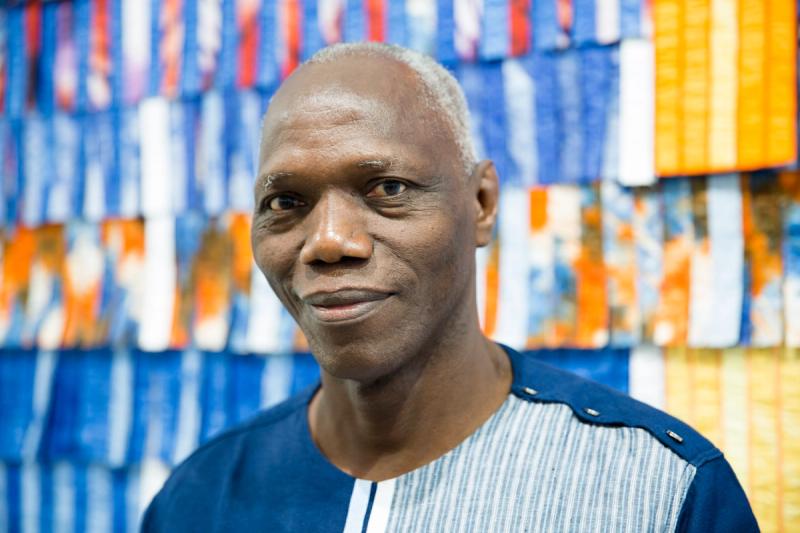Abdoulaye Konaté
“I can say that in my art there are two well-defined lines of thought. On the one hand, there is the purely aesthetic side, influenced by the nature and cultural traditions of Mali, my country, and that determines the colors and the materials of my work. On the other hand, there is a more spiritual side, which stems from the desire to investigate and describe through my work the human suffering, which reflects itself on the relations between states, politics, the environment, society and the family.”
Abdoulaye Konaté merges various traditions of West African craftsmanship with contemporary political commentary in his vibrant, monumental textile works. Based in Bomako, Mali, the artist cuts, dyes, sews, and assembles fabric into intricately detailed abstract and figurative tableaux. Interweaving colors that carry historical or social significance, his tapestries result from an intensive examination of such themes as the AIDS epidemic, deforestation, war and terrorism, human rights, and the relationship between power and religion. Across his work, he emphasizes resilience, critical expression, and the complexities of the human condition.
Born in 1953 in Diré, Mali, Konaté studied painting at Bamako’s National Institute of Arts and developed a multidisciplinary art practice at the Higher Institute of Plastic Arts in Havana, Cuba. Early on, he made works on paper featuring Malian cosmological symbols and fabric installations influenced by traditional clothes of Malian artists, singers, and hunter societies. Recently, his work has been exhibited at the 14th Gwangju Biennale (2023); 14th Dakar Biennale (2022); Centre Pompidou, Paris (2020); Zeitz Museum of Contemporary Art Africa, Cape Town (2020); and the 57th Venice Biennale (2017). In 2016, a retrospective of his work was presented at ARKEN Museum for Moderne Kunst, Copenhagen. Konaté is a founding member of the African Culture Fund, and in 2004, he founded the Conservatoire des Arts et Multimédia Balla Fasséké Kouyaté (CAMM–BFK) in Bamako. His numerous awards include the National Order of Mali (2009), France’s Order of Arts and Letters (2002), and the Léopold Sédar Senghor Grand Prize at the Dakar Biennale (1996). His work is featured in prominent museum collections worldwide, including the Musée national du Mali, Bamako; Metropolitan Museum of Art and Museum of Modern Art, New York; Centre Pompidou, Paris; and MAXXI: Museo nazionale delle arti del XXI secolo, Rome.
